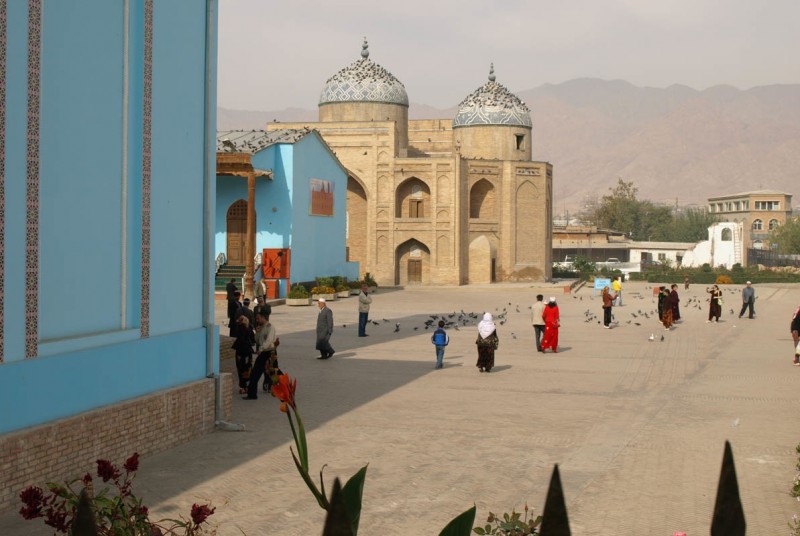
A mosque in northern Tajikistan. Image by Rob Cavese shared on the Kiva Fellows blog and Flickr.
When Europe's medieval rulers harnessed the church pulpit to guarantee unwavering loyalty from the populations they believed they had a divine right to rule over, they did not know they would be providing inspiration for Central Asian dictators centuries later.
In Tajikistan, where more than 90% of the population are Muslims, mosques and state religious leaders have become an efficient tool for the government to use against its political rivals.
After President Emomali Rahmon said that Islam does not need a political party, the Islamic Renaissance Party (IRPT) — the only serious rival to the government's power in Tajikistan — has been under relentless attack.
Writes Edward Lemon of EurasiaNet.org:
On Friday afternoons, imams across Tajikistan read their weekly, government-drafted sermons. The theme is often political, and often supports strongman President Emomali Rahmon. Last Friday, March 27, imams called on the faithful to demand the authoritarian government ban Tajikistan’s largest opposition party, the only legally operating religiously oriented party in Central Asia.
The Islamic Renaissance Party (IRPT) helped ensure peace at the end of Tajikistan’s devastating civil war in the mid-1990s. But Rahmon has steadily reneged on his promise to give 30 percent of government positions to his opponents in the war. Until a deeply flawed election early this month – which featured ballot-box stuffing and intimidation, according to international observers – the IRPT had managed to hang on to a couple of seats in parliament.
Official election results showed that the IPRT failed to clear the 5-percent threshold required to win seats in parliament. Unofficial estimates indicated that the actual share of ballots cast for the IRPT was much higher than that. Yet now, after unprecedented pressure, the IRPT is out in the cold, its future uncertain.
High ranking religious officials such as Mullah Saidakbar — Deputy Mufti of the Islamic Center of Tajikistan – issued the call to ban the the IRPT in the capital Dushanbe. Similar calls sounded in the two biggest mosques of Khujand, a key city in the north of Tajikistan.
As noted in an investigative report by RFE/RL's Tajik service, the four-page sermon titled ‘The Unity of the Society in Choosing the Right Path’ was signed and provided for Juma Prayers by an A. Mavlonov (the report did not uncover where Mavlonov works, but it is assumed he is a government official).
The author of the sermon wrote:
It is time that we correct ourselves and our society and not remain neutral about the future of our motherland. Therefore, I suggest that we close the IRPT because there is no need for it anymore. Alhalmullillah, we are Muslims, and that is enough for us.
Calling those who voted for the IRPT ‘separatists’, the sermon's author further suggested that Tajikistan only needed one political party concerned with the future of the nation, because one leader and one party is key to peace.
Whilst Muhiddin Kabiri, the IRPT's secular-minded and modern leader, has not reacted to calls to close his party, the party's political committee has labelled them unconstitutional.
And Kabiri's deputy, Saidumar Husayni, vented:
Бигзор, шӯрои уламо, кумитаи дин бо ширкати аҳли уламо ва намояндагони ҳизби наҳзати исломӣ мизи гирд ташкил диҳанд ва ба исбот расонанд, ки ҲНИТ бар зарари амнияти кишвар ва садди пешрафти ҷомеа аст. Исбот кунанд, ки воқеан камбуди барқ дар фасли сармо, фаъол нашудани корхонаҳои муҳим дар кишвар, вуҷуди фасод дар идораҳои давлатӣ… низ ҳама айби ҲНИТ аст, марҳамат, ҳизбро бубанданд
Let the Council of Mullahs and Committee of Religion organize a round-table with the participation of representatives of IRPT and prove that IRPT harms the security of the country and barricades the development of society. Let them close the party if they can prove that, actually, the IRPT is to blame for the winter electricity shortcuts, inactivity of important factories in the country, and the existence of corruption in state institutions.
The irony that imams seemingly serving the interest of politicians were criticising the IRPT for doing something similar was lost on some people. Lola, a reader of RFE/RL's Tajik service wrote:
Бархам дода шавад!! Номи поки Исломро ба сиёсат, олуда накуненд. Худ шохид будам, ки тарафдорони чавони ин хизб, баъд аз интихоботи парлумон дар Точикистон, ба як овоз мегуфтанд, ки дар кишвари мо дигар мусалмон намодааст, барои хамин ХНИТ голиб нашуд. Бинед бародарону хохарони азиз, ин магар истифодабарии номи поки Ислом бар манфиати хизбдорон нест?!
[IRPT] should be closed! Do not spoil the name of Islam. I witnessed how the young supporters of this party were saying after the elections that the IRPT lost because there are no longer any Muslims in our country. See dear brothers and sisters, is it not making use of the name of Islam for the goals of party-members?!
However, many people condemned the politicization of imams and mosques.
Dilshod said:
акнун дар масчид муллохо ба сиёсат дахолат мекунанд. Хукумат хар чиро хохад ба имомхатибон супориш медихад онхо дар масчид ба халк мехонанд.
инак имруз аз ин нома маълум шуд ки хукумат намехохад ки дигар хизбу харакатхо дар кишвар вучуд дощта бошад. ээээ гап бисер вале гап задан бефоида
In our mosques, mullahs interfere in politics now. The government tells imams whatever it wants, and they read it out to the people. This letter [referring to the Mavlonov's text for the sermon] showed that nowadays the government does not want any other parties and movements. There is a lot that I want to say, but it is useless.
Meanwhile Banda, a reader who claims to have attended prayers on Friday, called the mixing of politics and religious teaching a sin.
He wrote:
Окибат ин шуд ки кариб хама дуои анчоми намозро нахонда баромадем. Тасмим хамин ки дигар ба масчид намеравем. он чо чои фитна ва бози шудааст.
We left the mosque before [prayers] finished. We decided not to go there again because our mosques have turned into places of fraud.






